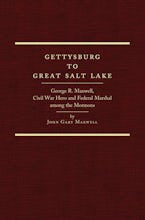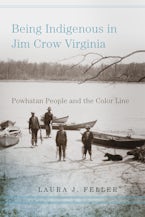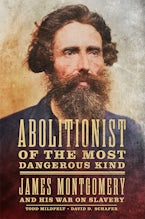- Home
- biography & autobiography
- history
- Gettysburg to Great Salt Lake
Gettysburg to Great Salt Lake
George R. Maxwell, Civil War Hero and Federal Marshal among the Mormons
Published by: University of Oklahoma Press
Imprint: The Arthur H. Clark Company
396 Pages | 6 x 10 | 19 b&w illus.
$39.95
With the onset of the Civil War, Maxwell volunteered for the First Michigan Cavalry and fought in most of the war’s major battles in Virginia and at Gettysburg. In his subsequent service, Maxwell waged a different war as he battled the Mormon church’s leadership over ownership of land, water, and timber. In the courts, in election outcomes, and in the legislature, Maxwell fought the Mormons’ affirmation that God’s law was superior to federal law. And as marshal, he was the first to properly conduct a federal trial in the Utah Territory, when John D. Lee was tried for the massacre of 120 Arkansas emigrants at Mountain Meadows.
Gettysburg to Great Salt Lake recognizes Maxwell as both a bona fide Civil War hero and an unappreciated shaper of Utah history. His biography reveals this period through the eyes of a soldier and civil servant who embodied federal authority in Utah during its turbulent post–Civil War years.
“. . . John Gary Maxwell, M.D., has crafted the biography of a man to whom he is not related but whose story he finds key in understanding Utah's violent, tortuous territorial passage to statehood. . . .
For Mormon apologists and others viewing federal appointees with blanket distaste, Dr. Maxwell's portrait of General Maxwell is a hard sell. Yet those who pass by this study will miss not only a provocative, worthy biography but several valuable dividends in the form of by-products not found elsewhere: a unique assessment ofUtah's detachment from the Civil War and its impact on the territory's long quest for statehood; a clinical tutorial on the human wreckage created in that conflict's combat; a glimpse into the social and psychological isolation of federal appointees posted to Salt Lake City; and an understanding of the duties of U.S. marshals in the West. . . .In Maxwell's discussion of his subject's medical travails one finds insight and graphic eloquence that distinguishes Gettysburg to Great Salt Lake from the vast majority of biographies about Civil War participants and the carnage they witnessed. Maxwell succeeds brilliantly in limning the chasm between Utah Mormons and Civil War veterans.For students of the Civil War, the American West, and Utah's long, troubled territorial period, John Gary Maxwell's Gettysburg to Great Salt Lake is a highly unusual, valuable source written well. If ever tempted to take two aspirin while calling a physician, one might better delve into Dr. Maxwell's book while keeping dose at hand a brace of complementary studies shedding light on the complex conflicts George R. Maxwell found in Utah: David L. Bigler's Forgotten Kingdom: The Mormon Theocracy in the American West, 1847:-1896; and Ronald W. Walker's Wayward Saints: The Godbeites and Brigham Young (Urbana: University oflllinois Press, 1998).”—William P. MacKinnon, past-president of the Mormon History Association and author of At Sword's Point, A Documentary History of the Utah War.












